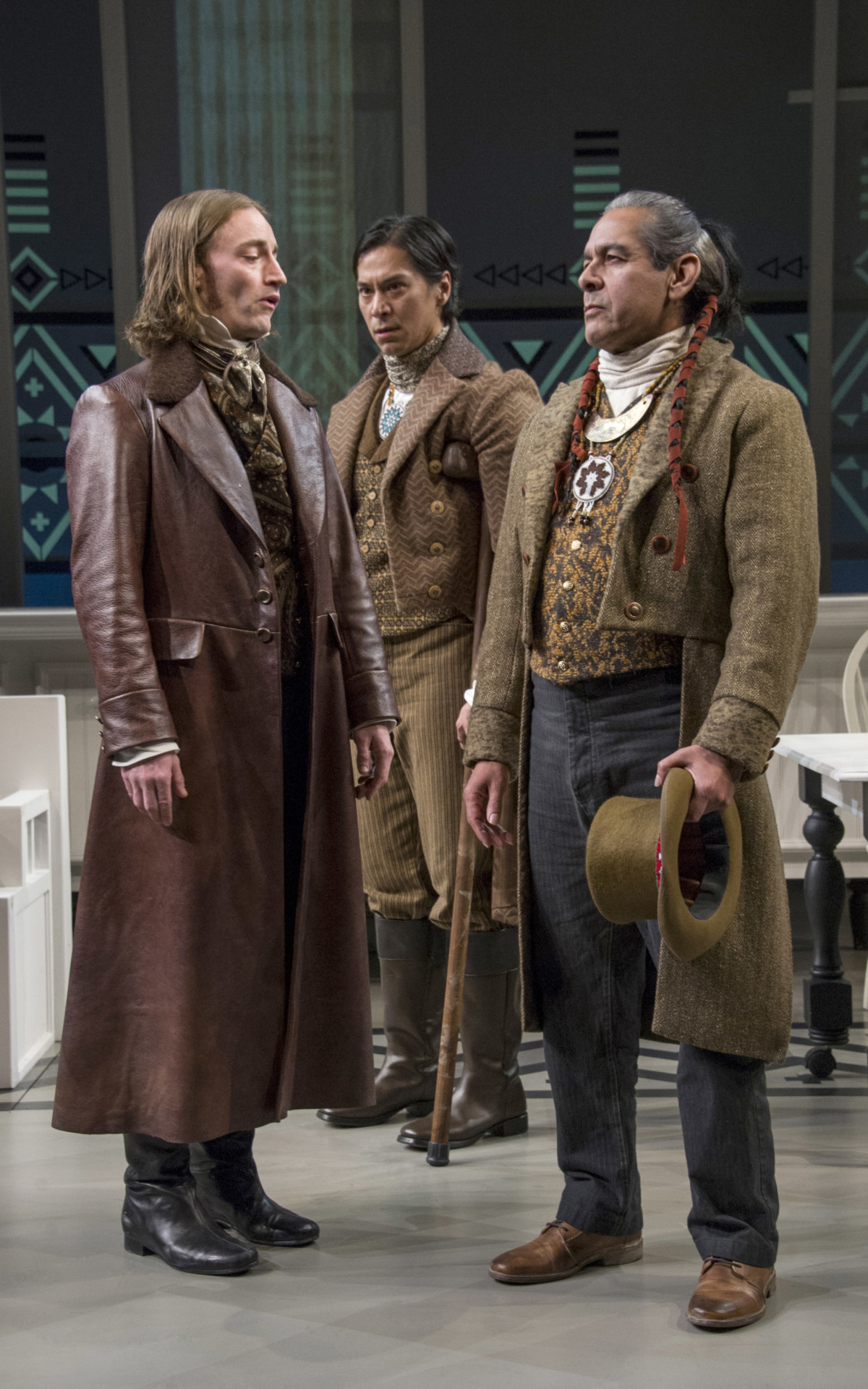“Sovereignty” is about violence, and how people deal with violence. In the play, it takes various forms — from domestic violence, to racism, to murder. It covers hundreds of years of U.S. history, starting with the violence perpetrated by European settlers against Native Americans, and how those indigenous peoples have tried to fight back.
The production, now playing at Washington D.C.’s Arena Stage through February 18th, was written by Mary Kathryn Nagle. She’s a direct descendant of some of the Cherokee nation’s most prominent leaders.
Ahmad Coo is a producer and copy editor for the Global Business show on CGTN America. His analysis represents his views alone.
The play focuses on Sarah Polson (played by Kyla Garcia) and her battle to protect the Cherokee Nation’s sovereignty and the right to prosecute crimes that are committed on tribal lands.
The production is an exorcism of sorts targeting the U.S. and its treatment of Native Americans.
“Sovereignty” succeeds in trying to present a different picture of Nagle’s heritage. She reframes her people’s history — debunking the dominant narrative that her culture and history were somehow inferior to the European settlers’.
Unfortunately, Nagle’s script is far from perfect. There are some points in the play when the dialogue gets so stilted and cliched it took away from the overall impact of the play. I wanted so badly to applaud this effort, but “Sovereignty” has some serious flaws.
Nagle cuts back and forth from the 1800s to the present day — sometimes even juxtaposing the two time periods and having characters jump between the past and the present. At some points it got so confusing, that I decided to just let the scenes wash over me.

(L to R) Joseph Carlson (Andrew Jackson/Ben), Kalani Queypo (John Ridge) and Andrew Roa (Major Ridge/Roger Ridge) in Sovereignty, running January 12-February 18, 2018 at Arena Stage at the Mead Center for American Theater. Photo by C. Stanley Photography.
Moreover, since the dialogue was so awkward there wasn’t much the actors could do to keep some scenes from looking like it came from a daytime television soap opera.
This is one of the few plays written by a Native American playwright, and produced by a major theatre in the U.S. If you consider the some 242 years that this country’s been in existence, one would think that the nation’s very first peoples should have been featured prominently in its culture and history. They are not.
U.S. history is littered with examples of the subjugation of other peoples, from the African slave trade, the Philippine American War in 1899 (in which up to a million people died in what were virtually concentration camps), the dropping of atomic bombs on Hiroshima and Nagasaki, and the invasions of Nicaragua, Iraq, and Afghanistan. Given such a past, it’s not surprising that this country got its start by practicing ethnic cleansing. The United Nations defines ethnic cleansing as rendering an area ethnically homogenous by using force or intimidation to remove from a given area, persons of another ethnic or religious group.
“Removal” is visited on several levels in “Sovereignty”. Beyond forced expulsion of the Native Americans from their lands, the play also highlighted the removal of the right of Native Americans to govern themselves, as well as the removal of complex Native American characters in American culture.

Kyla García (Sarah Polson) in Sovereignty, running January 12-February 18, 2018 at Arena Stage at the Mead Center for American Theater. Photo by C. Stanley Photography.
Nagle’s view of the Native American experience offers counters to the stereotypical tropes.
The play shows how President Andrew Jackson undermined the Cherokee Nation’s right to govern their lands with their own set of laws and traditions. On this point, Nagle was very even handed in her treatment of Jackson’s betrayal of the tribe. That restraint gave made Jackson’s actions that much more abominable.
Nagle treats Native American characters John Ridge and Major Ridge (her ancestors) as reasonable individuals willing to compromise with the U.S. government, contrary to the Cherokee narrative that they were traitors. Kalani Queypo’s portrayal of John Ridge helped imbue the historic figure with courage and integrity which flies in the face of the earliest accounts of Europeans settling into their lands.
The play was also careful not to present the characters as victims but as empowered individuals who are able to have moments of levity even in the grimmest of circumstances. “Why do Indians hate snow?” Sarah’s father (played by Andrew Roa) would ask in one of the most despairing moments of the play. “Because it’s white and it’s all over our land.”
Despite its darkness and its overall clunkiness “Sovereignty” is at its core, an nuanced take on the Native American experience.
 CGTN America
CGTN America
 (L to R) Jake Waid (John Ross/Jim Ross) and Kyla García (Sarah Polson) in Sovereignty, running January 12-February 18, 2018 at Arena Stage at the Mead Center for American Theater. Photo by C. Stanley Photography.
(L to R) Jake Waid (John Ross/Jim Ross) and Kyla García (Sarah Polson) in Sovereignty, running January 12-February 18, 2018 at Arena Stage at the Mead Center for American Theater. Photo by C. Stanley Photography.

